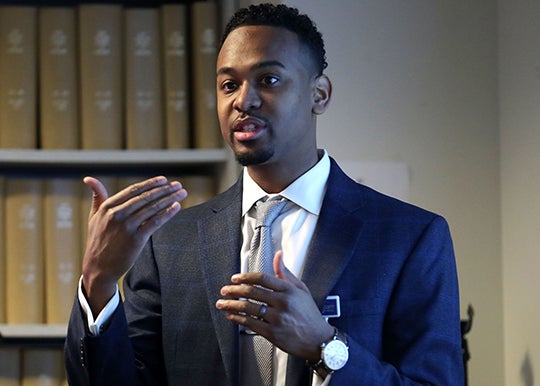
Dr. Cameron Webb teaches during a section of a health policy class at the
University of Virginia Medical Center.
In January 2017, Dr. David Wilkes, dean of the University of Virginia School of Medicine, sat in the Jefferson School African American Heritage Center and watched a young black doctor speak about the legacy of the Rev. Martin Luther King Jr.
“I thought, he needed to be at UVa,” Wilkes said. “For someone who is a junior in their career, the knowledge and network he had was really remarkable.”
Wilkes quickly convinced Dr. Cameron Webb to join the medical faculty as an assistant professor of medicine and director of health policy and equity. While Webb started his appointment at UVa in September, his return to Grounds came earlier.
On Aug. 12, Webb drove from Baltimore to Charlottesville to organize a black alumni response to the white supremacist Unite the Right rally. A 2005 graduate of UVa, Webb wanted current black students to feel loved and supported. That message, he said, informs his research in health policy and his passion for social justice, which took him through two graduate degrees and to the White House by age 32, and earned him a spot on the Congressional Black Caucus’ National Minority Quality Forum’s 40 under 40 list in March.
As an undergraduate and Echols Scholar, Webb said he was focused on medical school, but slowly came to realize that he also wanted to make a difference beyond a hospital’s walls.
“I got really interested in the social justice component and how different people experience health care differently,” he said. “Being a doctor was my lifelong dream, but I realized that would only allow me to address one small sliver of that bigger piece. And when I thought about what additional piece would allow me to be a social justice advocate, I realized I wanted to go to law school.”
He decided to get a medical degree at Wake Forest University and a law degree at Loyola University.
In his second year at Wake Forest, Webb and other medical students were trying to think of ways to be more involved in the area surrounding Winston-Salem, North Carolina, he said, and he decided they should open up a free clinic.
The Delivering Equal Access to Care Clinic opened in 2008, and is a student-run free clinic that offers doctor’s visits, specialty services and social services to vulnerable residents.
After three years in medical school, Webb headed to Loyola for his law degree. When he returned to Winston-Salem for his fourth year of medical school, he was pleased to see that the clinic was running smoothly.
“It’s cool to see these investments and additions and social justice in a healthcare setting,” he said. “It’s incredible to think that if you just galvanize people they can create a huge change.”
The interest in bridging town-gown divides and getting students engaged in their community continued through law school and volunteer work in Chicago, but he started to think about ways to have an impact beyond one school or one town.
After his final year of medical school, Webb applied to be a White House fellow. He thought he’d be able to work for the first black president and the first female president, he joked, but ended up being in the White House for the first six months of President Donald Trump’s term. He was able to see the day-to-day workings on topics such as social determinants of health, Medicaid and costs of prescription drugs, and intends to keep working in those areas, in and out of academia.
After a year in D.C., Webb said he’s less idealistic about change, but more reassured by governmental processes and more aware of the power of the executive branch.
“That colors the way you do research and engagement, because it’s not all about meeting with your congressman,” Webb said. “It’s about being a stakeholder in a bunch of different environments.”
They are also things that UVa is directing more resources toward. More medical students should learn about health policy and think about a patient’s income, access to health food, education and transportation when providing care, Wilkes said.
“He’s really teaching medical students how to be thoughtful participants and advocates,” Wilkes said. “You have to know that most of the issues regarding health care aren’t due to health; they’re due to the social determinants of health. If you deal with those aspects, health improves dramatically.”
Webb also said he is impressed with the diversity of students in his classes.
“This is one of the most diverse group of students I’ve ever seen,” he said. “And it’s not just about increasing numbers; it’s about recognizing what comes into a room when diversity is present and how it improves quantifiably how we think and how we solve problems.”
Webb said he’s not ruling out future work in Washington, but for now, he’s teaching several classes on health policy, taking care of his two young children, mentoring students of color and participating in community events such as Liberation Day.
“I think I’m going to be one of those people who comes in and out of government over the course of my career,” he said. “I think we have a lot of room to go and to grow in our health system, and I’m excited to work on that.”
(Originally published in UVA PULSE Online)
Filed Under: Media Highlights

Comments